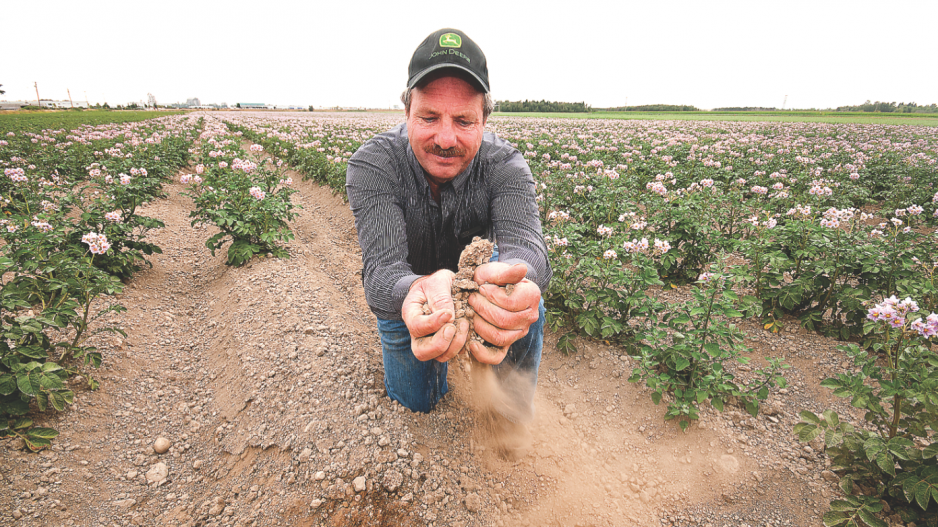Like many British Columbia farmers this summer, Lorne Hunter has been struggling with dry soil and early crops.
“I’ve only got one irrigator and 160 acres to cover,” said Hunter, who farms near Salmon Arm. “The ground dries out faster than I can go over it a second time.”
Hunter doesn’t pay any fees for his water use because he uses groundwater from an aquifer underneath his farm, not water from a stream or lake.
That’s about to change. With the rewriting of B.C.’s century-old Water Act, groundwater will be licensed in the province for the first time. B.C. was one of the only jurisdictions in North America to leave groundwater unlicensed and largely unaccounted for.
“You can’t manage what you don’t know, both in volume and location and the interconnectedness of … surface water and bedrock water,” said Hunter, who will have to license his two wells and pay around $250 extra a year.

Under B.C.'s new water law, dairy farmer Lorne Hunter will have to license his groundwater wells and pay a fee. The government is currently in the dark when it comes to the location and quantity of much of the province's groundwater | Submitted
Water experts are praising the new act but are also warning that without adequate staffing and money to manage water and enforce the new rules, the precious resource will continue to flow down the drain.
Much attention has been focused on Nestlé’s (VTX:NESN) water bottling operations near Hope, after media reports about Nestlé highlighted the lack of regulation around groundwater. Public outrage has continued over the $2.25 per million litre fee – considered by many to be too low – that Nestlé will pay under the new water law.
But the issue goes beyond Nestlé: most industrial and municipal users could stand to pay much more than has been proposed, said Deborah Curran, a University of Victoria law professor.
“There is so much more that we need to spend on water administration and management that we could increase the rents significantly before even getting into the issue of whether we are selling water or not,” said Curran, referring to fears that increasing the cost for water bottlers could lead to the commodification of water.
Fees for B.C. water could be raised to 10 times what they are today and still be competitive with other jurisdictions, Curran said.
Those higher fees could then be used to manage water, something experts agree is becoming increasingly pressing as more frequent droughts are expected in the future.
Curran noted that a fee hike would have to reflect how different sectors use water. For instance, agriculture would need to be charged less in order to remain profitable, while urban household users could stand to pay more.
Business in Vancouver previously reported on oil and gas companies paying between $3.50 and $5 per cubic metre for water in B.C. That compares with the $2.25 per 1,000 cubic metres (equal to one million litres) that the province plans on charging for both surface and ground water.
Even as the effects of climate change are felt across western North America, it’s going to take a long time before the new act is fully implemented. Licensing and mapping groundwater is one huge chore: the Ministry of Environment doesn’t know the location of Hunter’s two wells or thousands of other groundwater wells across the province.
“How do you get the farmers to come in?” said Ted van der Gulik, chairman of the Irrigation Industry Association of BC and a former senior engineer with the Ministry of Agriculture.
“We don’t even know where all the wells are because it was voluntary as to whether they logged the wells.”
Water sustainability plans, another feature of the act, will allow water licence holders to act co-operatively in times of drought. But the complicated plans will take years to complete, van der Gulik said.
Meanwhile, reviews of existing water licence holders for need and efficiency won’t even start until 2046.
California’s new water restrictions will take around 40 years to implement, even as the state struggles with dwindling supply and severe drought, said Hans Schreier, a professor emeritus at the University of British Columbia who studies water systems.
The changes to B.C.’s system could easily take that long, van der Gulik said.
"Irrespective of what perspective you come from, we need those numbers," Curran said. “Even if certainty is uncertainty, given the way that hydrology is changing, we need a lot more information to be able to provide trade-offs for the future when we’re dealing with less water.”
@jenstden




